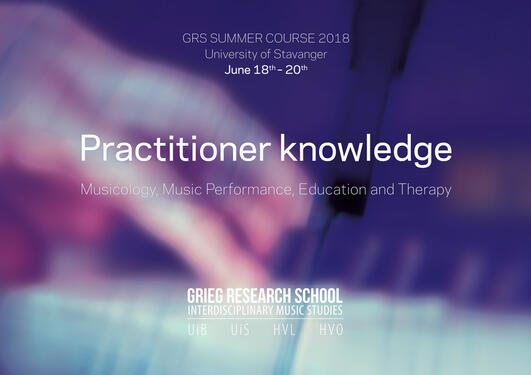Lina Navickaité-Martinelli
The Performer, the Music and the Others: New Types of Knowledge for a Practicing Musician
Main content
Through the course of music history, the cultural and professional role and function of the music performer has been perceived in various ways, and this process is an ongoing one. The ‘job’ of a performer hardly ever consisted of mere music playing, but particularly nowadays it encompasses a number of private and public, musical and extra-musical variables. Performers have their own personality and inclinations; they are exposed to different forms of education and influences; they develop certain technical and stylistic abilities; they find certain repertoires more suitable than others; they confront themselves with composers and their requests/indications; they have to take into account social demands to given repertoires; intentionally or not, they develop a public persona; finally, they create various media interfaces that allow the audience to access all the previously-listed features. Each of these variables produce several different (yet inter-related) discourses that make ‘performance’ and ‘performer’ extremely complex and dynamic concepts.
The aim of this lecture is to demonstrate the musical, cultural and social functions attributed to classical music performers, as well as the importance of ‘polyfunctionality’ to the modern performer’s activities. The changing realities of the musical performer’s work and the functions attributed to them in the nowadays’ culture (from the intellectual artistic researchers to the entrepreneurs of their own activity, from music pedagogues to the mystified stage stars, etc.), as well as the features (both personal and professional) and knowledge, necessary for performing these functions, shall be analyzed and discussed. The analysis of the diverse activities of music performers and their modern discourses, the media in which the performers’ polyfunctionality is manifested, and performers’ signifying practices in various social and cultural circumstances is possible by borrowing the tools from musicology, social semiotics and cultural studies.
Key Questions
- What are the new types of knowledge and practices that contribute to the notion of 'polyfunctionality' in the modern performers' work?
- What representations and self-representations do musical performers put into action while interacting with social and cultural contexts, and how are these related to different types of performer-listener communication processes as well as to the consumption and marketing of current performance practices?
Recommended Reading
- Codognet, Philippe (2002). Ancient images and new technologies: The semiotics of the web. Leonardo 35 (1): 41–49.
- Deresiewicz, William (2015). The Death of the Artist – and the Birth of the Creative Entrepreneur. The Atlantic, January-February 2015 issue. Available online at: https://www.theatlantic.com/magazine/archive/2015/01/the-death-of-the-ar...
- Navickaitė-Martinelli, Lina (2014). From Onstage to Online: On Musicians’ (Self)Representation in Old and New Media. Part 4 in: Lina Navickaitė-Martinelli, Piano Performance in a Semiotic Key: Society, Musical Canon and Novel Discourses. Helsinki: Semiotic Society of Finland. Available online at: https://helda.helsinki.fi/handle/10138/136475
Biography
Lina Navickaitė-Martinelli holds a PhD in musicology from the University of Helsinki and currently is Associate Professor and Senior Researcher at the Lithuanian Academy of Music and Theatre, Head of the Musicologists’ Section at the Lithuanian Composers’ Union. Editor of several academic collections, Navickaitė-Martinelli has presented numerous conference papers and has published scientific articles in international journals and article collections. Her books A Suite of Conversations: 32 Interviews and Essays on the Art of Music Performance and Piano Performance in a Semiotic Key: Society, Musical Canon and Novel Discourses have been awarded as the best Lithuanian musicological works of 2010 and 2014 for innovative research of music performance. She focuses her research on various aspects of the music performance phenomenon, mainly approaching performance from the semiotic and sociological perspective. Navickaitė-Martinelli is the founder and co-ordinator of the LMTA Hub of Artistic Research and Performance Studies (HARPS).
More information at linamartinelli.wordpress.com.

